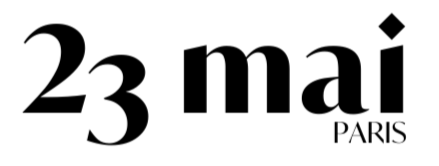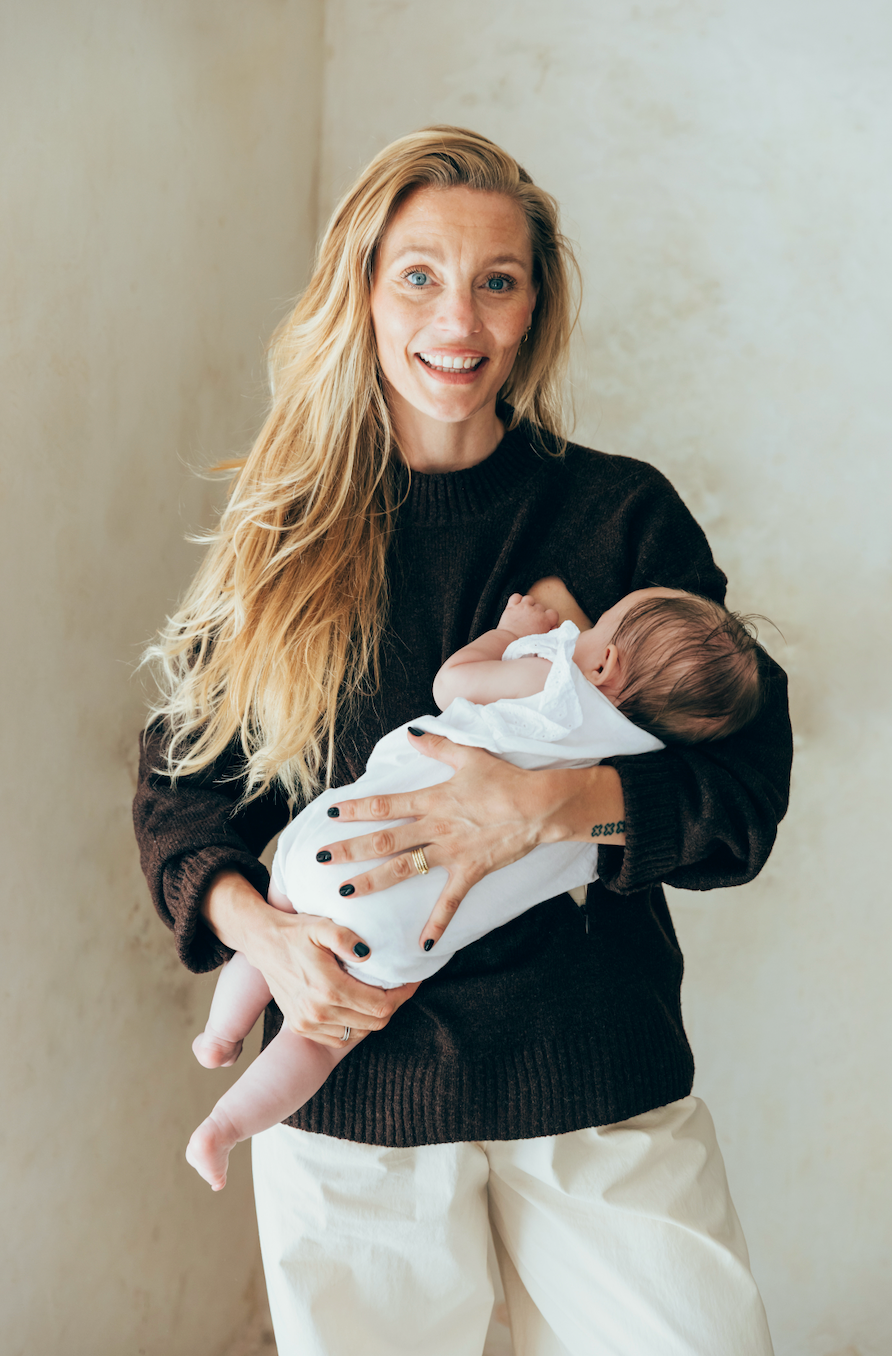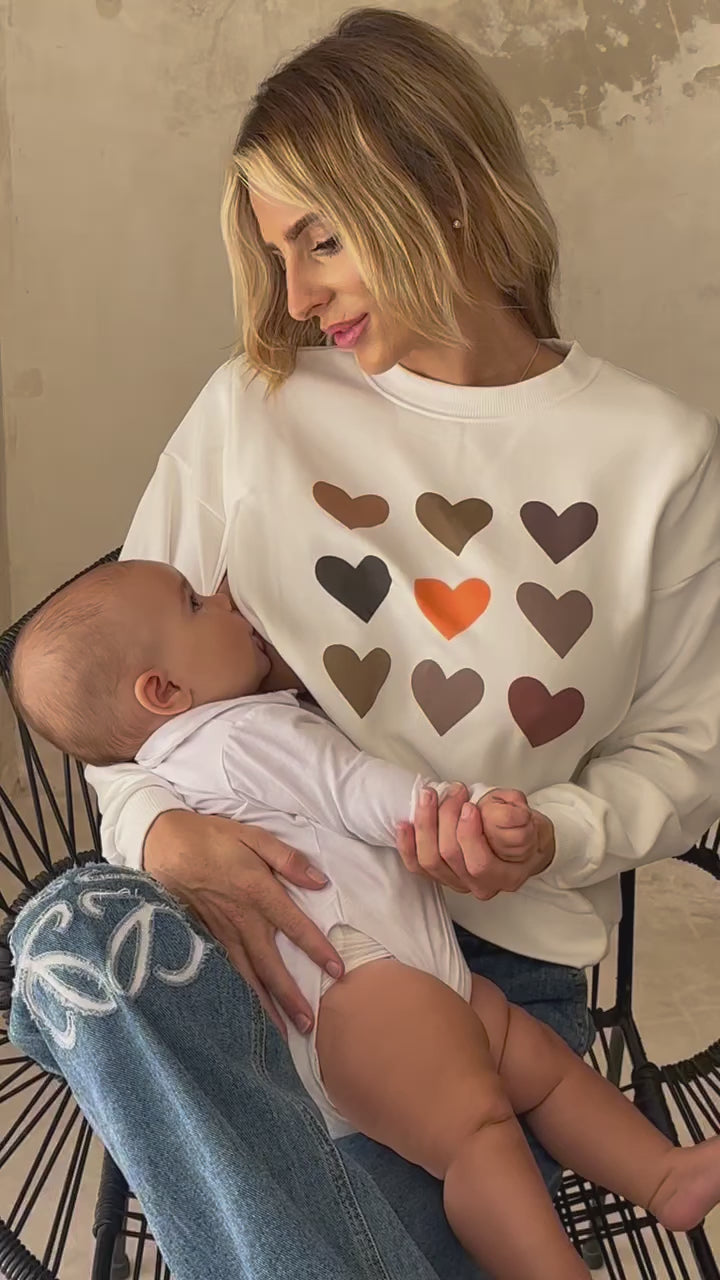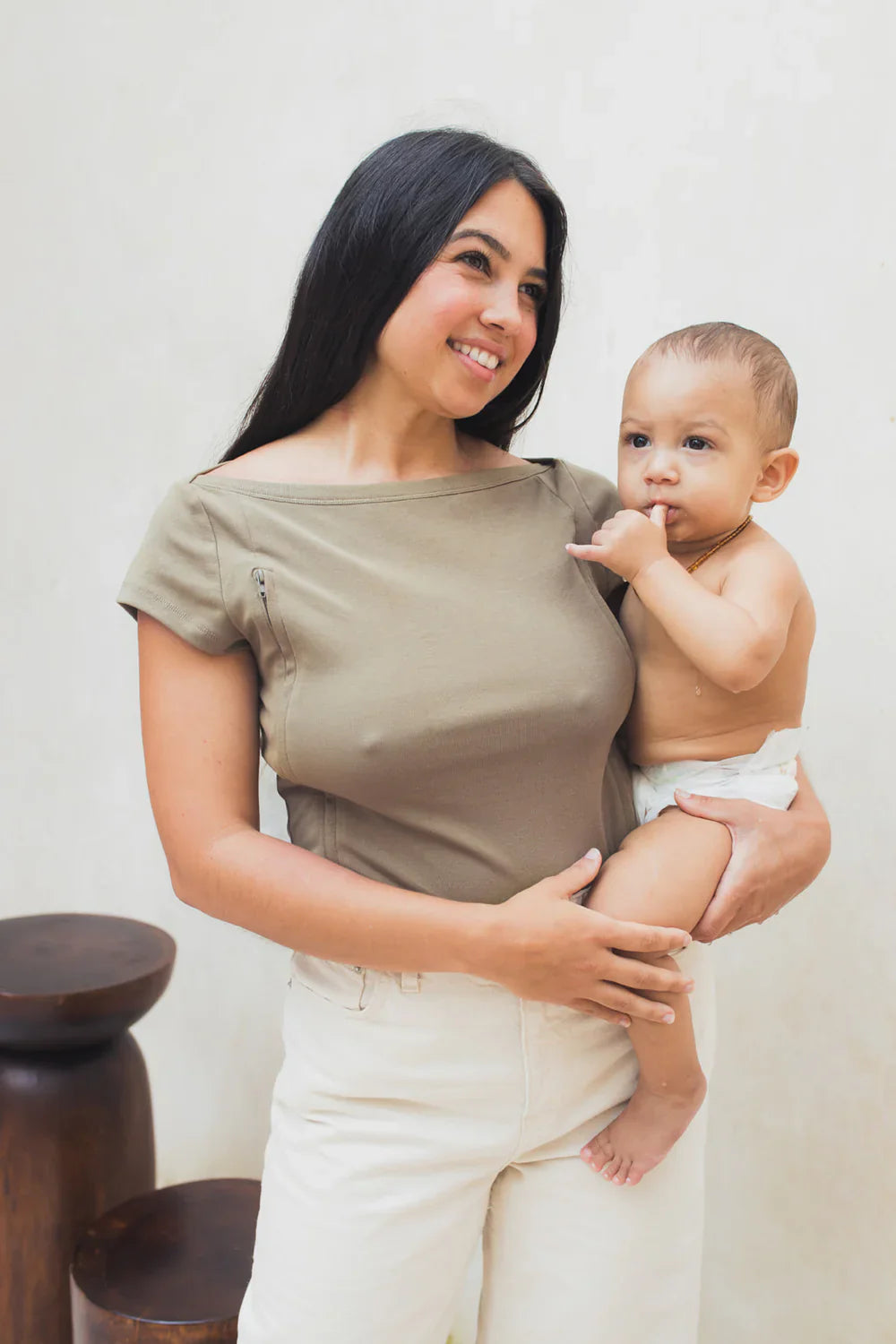
How long should I breastfeed my baby?
Bonjour, chères mamans 23 Mai Paris ! L'une des questions qui revient le plus souvent dans l'esprit d'une maman qui allaite, qu'elle soit novice ou expérimentée, est la suivante : « Jusqu'à quand dois-je allaiter mon bébé ? ». C'est une question chargée d'attentes, d'opinions extérieures et, surtout, du désir profond de faire ce qu'il y a de mieux pour nos petits. Chez 23 Mai Paris, nous accompagnons les mamans dans leur quotidien d’allaitement avec des essentiels pensés pour durer, comme notre collection de robes d’allaitement.
The starting point: what do the experts say?
To begin with, it's a good idea to be familiar with the recommendations of the main global and national health organizations, as they provide us with a solid scientific basis:
World Health Organization (WHO) and UNICEF :
They recommend exclusive breastfeeding for the first 6 months of life. This means that the baby receives only breast milk, with no other food or drink, not even water (your milk contains everything the baby needs!).
From 6 months :
It is advisable to introduce nutritionally adequate and safe complementary foods (porridges, small pieces, depending on the method you choose), while continuing to breastfeed until the child is 2 years or older, or until both mother and child wish to do so.
American Academy of Pediatrics (AAP):
It shares similar recommendations, supporting exclusive breastfeeding for 6 months, then continuing with complementary foods, ideally up to the age of one year and beyond, according to the mutual wishes of mother and child.
Mexican Health Secretariat and official Mexican standards :
They are generally in line with WHO recommendations, encouraging exclusive breastfeeding for the first six months and continued breastfeeding with complementary foods up to the age of two or more.

Why "until the age of 2 or more"? The incredible benefits of prolonged breastfeeding
The recommendation "up to 2 years or more" may surprise you. In our culture, we often think of breastfeeding beyond one year as something "abnormal" or unnecessary. But nothing could be further from the truth! Your milk remains a nutritional and emotional treasure for your child, even when he's already eating a wide variety of foods.
Benefits for your baby:
- Continuous and adapted feeding : your milk is intelligent! Its composition continues to evolve to meet the needs of your growing child. It continues to provide high-quality proteins, essential fats for brain development, vitamins and minerals. Even after one year, it can cover a significant part of his caloric and nutritional needs.
- Constant reinforcement of the immune system: Your milk is rich in antibodies, living cells and immune factors that protect your child against infection. This protection is particularly valuable when your child starts going to nursery or exploring the world, exposing himself to more germs. Breastfeeding an older child who's ill means offering comfort and an extra dose of immune defence.
- Digestive health : Breast milk is easy to digest and promotes healthy intestinal flora at all ages.
- Cognitive development: Some studies suggest a link between longer breastfeeding and better cognitive development.
- Emotional comfort and bonding: For a young child, the breast is not just a source of nourishment, it's also a source of comfort, security, love and refuge. It's a wonderful tool for calming him when he's sad, scared, tired or hurt. It strengthens the unique bond between you.
- Reduced risk of chronic disease: Prolonged breastfeeding has been associated with a lower risk of overweight, obesity and type 2 diabetes in adulthood.
Benefits for you, Mom :
Yes, you benefit too!
- Reduced cancer risk: Breastfeeding longer (cumulatively) reduces your risk of breast and ovarian cancer.
- Protection against other diseases: Breastfeeding is associated with a lower risk of type 2 diabetes, hypertension and cardiovascular disease.
- Helps postpartum recovery: Although the impact is greatest in the first few months, prolonged breastfeeding can continue to help your body.
- Emotional bonding: It's a special moment of connection with your child, a break from the daily hustle and bustle.

Factors influencing YOUR decision about the duration of breastfeeding
Although the recommendations are a guide, the final decision is a compromise between your baby's needs, your needs and your context:
- Your baby's signs: Some babies show a gradual, natural detachment from the breast (respectful or child-led weaning). Others may continue to be happy until the age of 3 or 4, or even longer, if left to their own devices.
- Your well-being and comfort: How do you feel when you're breastfeeding an older child? Do you find it pleasant, exhausting, or both? It's perfectly normal for your feelings to change over time.
- Votre mode de vie : le retour au travail, les horaires, les autres enfants peuvent exercer une influence. Cependant, il est possible d'allaiter et de travailler ! Chez 23 Mai Paris, nous savons que des vêtements adaptés sont une aide précieuse. Nos t-shirts d'allaitement et nos robes d'allaitement sont conçus pour vous permettre d'exprimer votre lait ou d'allaiter discrètement au travail ou ailleurs.
- Pression sociale ou culturelle : Malheureusement, il arrive parfois que des commentaires ou des regards vous font douter de l'opportunité d'allaiter un enfant « plus âgé ». Rappelez-vous les recommandations des experts et, surtout, faites confiance à votre instinct et à ce qui est le mieux pour votre famille. Vous trouverez du soutien et des informations dans nos blogs précédents pour vous sentir plus en confiance.
- New pregnancies: Some women continue to breastfeed during a new pregnancy (tandem breastfeeding after the birth of the new baby), others decide to wean.
Breastfeeding on demand: essential at every stage
Whether your baby is a few days old, a few months old or several years old, breastfeeding on demand remains the guiding principle. This means that you breastfeed your baby when he asks for it, not only because he's hungry, but also because he's thirsty, needs to be comforted or needs to be touched.
- Newborns: Breastfeed very frequently, 8 to 12 times every 24 hours, or even more. Their stomachs are tiny!
- Babies from 6 months to 1 year: Feeding may become less frequent as complementary feeding takes hold, but breast milk remains their main source of nutrition.
- Small children (toddlers) : their feeding habits can be highly variable. Some days they feed more (if they're sick, tired or going through a change), others less. Feeds may be shorter and "on the go".
Adapting to the different stages of breastfeeding:
- Les six premiers mois (allaitement exclusif) : Concentrez-vous sur une bonne prise du sein, allaitez à la demande et profitez de ce contact étroit. Votre confort est essentiel ; veillez à avoir une bonne posture et à porter des vêtements d'allaitement qui facilitent l'accès, comme nos confortables sweats d'allaitement pour les journées plus fraîches.
- From six months to one year (introduction of solid foods) : breast milk remains the priority. At first, offer breast milk BEFORE solid foods. As your baby eats more solid foods, the order may vary. Continue to breastfeed on demand.
- Over one year (breastfeeding with a toddler): Here, breastfeeding becomes much more than just a matter of nutrition. It's a powerful parenting tool.
- Gérer les « urgences » : un enfant qui court partout peut réclamer le sein à tout moment. Avoir des vêtements pratiques issus de notre collection de vêtements d'allaitement vous facilitera la vie.
- Limits (if necessary): if you feel you need to set certain limits (for example, not breastfeeding in certain places or at certain times), you can do so in a respectful way, offering alternatives and explaining with kindness.
- "Acute mamitis": it's normal for young children to seek the breast more during phases of anxiety linked to separation or major changes.

Withdrawal: a gradual, emotional process
Sooner or later, breastfeeding comes to an end. Weaning is a process that can be initiated by the baby (natural or child-directed weaning) or by the mother.
- Child-led weaning : usually progressive. The child gradually loses interest. It can occur between the ages of 2 and 4, or even later.
- Mother-led weaning: if you decide the time is right, proceed gradually and respectfully:
- Don't offer, don't refuse (if possible): start by not actively offering, but don't refuse if the child asks.
- Replace feeds: start with the feed that seems least "important" to your child (perhaps the mid-afternoon feed) and replace it with a snack, a game, a story, lots of cuddles.
- Distraction: offer alternatives when he asks for the breast.
- Push back: "Not now, darling, but in a little while / after we've finished playing this".
- Talk to your child: explain in simple words (if he's old enough to understand) that you're changing certain things.
- Lots of patience and love: there will be better days and harder days. Be flexible.
Weaning is an emotional process for both you and your baby. Let yourself feel these emotions. There's no rush. If one strategy doesn't work, try another or wait a while.
Nursing clothes: your long-term ally
Peu importe la durée pendant laquelle vous décidez d'allaiter, chez 23 Mai Paris, nous voulons que vous vous sentiez à l'aise et élégante. Nos vêtements d'allaitement sont conçus pour vous accompagner dès les premiers jours jusqu'à ce que vous et votre bébé décidiez qu'il est temps de clore ce chapitre. La facilité d'accès, la discrétion et la qualité de nos vêtements vous permettront d'intégrer l'allaitement dans votre vie quotidienne sans complications, vous encourageant à continuer aussi longtemps que vous le souhaitez.
So when is the "right" time?
The "right" time to breastfeed is the time that's right for you and your baby. There's no magic expiration date. Expert recommendations give us an ideal minimum, but it's up to the two of you to decide on the maximum. It could be six months, one year, two years, three years or more. Every drop of breast milk and every moment of connection counts.
Trust your instincts, get informed, seek support from those around you (and here at 23 Mai Paris, you'll always be welcome!) and enjoy this unique experience. Whatever you decide, it will be the best for your family!
How long have you breastfed or do you plan to breastfeed? What challenges or joys have you encountered along the way? We'd love to hear from you in the comments!
If you are breastfeeding, here are some of our nursing clothes that may interest you:
T-shirts d'allaitement
T-shirts d'allaitement imprimés
T-shirts d'allaitement personnalisés
T-shirts d’allaitement basiques
Hauts d’allaitement personnalisables
Pulls d'allaitement
Sweat-shirts d'allaitement
Pulls d'allaitement maille
Débardeurs d'allaitement
Robes d'allaitement
Pyjamas d'allaitement
vêtements d'allaitement
Vêtements de maternité et d'allaitement
Vêtements d'allaitement à ouverture sur le côté
Vêtements d'allaitement grande taille
Vêtements d'allaitement d'été
Vêtements d'allaitement chauds
Vêtements d'allaitement brodés
Vêtements d'allaitement d'hiver
Vêtements d'allaitement confortables
Vêtements d'allaitement en coton
Vêtements de grossesse et d'allaitement
Vêtements d'allaitement originaux
Vêtements d'allaitement pas chers
Vêtements d'allaitement personnalisés
Vêtements d'allaitement en soldes
Vêtements d'allaitement à manches courtes
Vêtements d'allaitement à petit prix
Vêtements d'allaitement à zip
Vêtements d'allaitement abordables
Vêtements d'allaitement amples
Vêtements d'allaitement beiges
Vêtements d'allaitement blanc
Vêtements d'allaitement bleu
Vêtements d'allaitement discrets
Vêtements d'allaitement doux
Vêtements d'allaitement en promotion
Vêtements d'allaitement gris
Vêtements d'allaitement Imprimés
Vêtements d'allaitement jaunes
Vêtements d'allaitement leopard
Vêtements d'allaitement noir
Vêtements d'allaitement rose
Vêtements d’allaitement sobres
Vêtements d'allaitement tendances
Vêtements d'allaitement unis
Vêtements de sport pour l'allaitement
T-shirt allaitement imprimé
T-shirt allaitement personnalisé
T-shirt allaitement coloris uni
T-shirt allaitement manches longues
T-shirt allaitement blanc
T-shirt allaitement bleu
T-shirt allaitement noir
T-shirt allaitement gris
T-shirt allaitement camel
T-shirt allaitement léopard
T-shirt allaitement brodés
T-shirt allaitement coton
T-shirt allaitement zip
T-shirt allaitement été
T-shirt allaitement hiver
T-shirt grossesse allaitement
T-shirt allaitement milk
T-shirt allaitement coeur
T-shirt allaitement pas cher
T-shirt allaitement ouverture coté
T-shirt allaitement discret
T-shirt allaitement confortable
T-shirt allaitement originaux
T-shirt d'Allaitement avec col en V
T-shirts d'allaitement jaune
T-shirts d'allaitement marron
T-shirts d'allaitement multicolore
T-shirts d'allaitement rose
T-shirts d'allaitement rouge
T-shirts d'allaitement unis
Pyjamas d'allaitement
Pyjamas d'allaitement 2 pièces
Pyjamas d'allaitement en promotion
Pyjamas d'allaitement en soldes
Pyjamas d'allaitement leopard
Pyjamas de maternité
Chemises de nuit d'allaitement
Sweat-shirts d'allaitement
Sweat-shirts d'allaitement à ouverture sur le côté
Sweat-shirts d'allaitement en promotion
Sweat-shirts d'allaitement pas chers
Sweat-shirts d'allaitement verts
Sweat-shirts d'allaitement roses
Sweat-shirts de grossesse
Sweat Shirts d'allaitement blancs
Pulls allaitement zip
Pulls allaitement maille
Pulls allaitement laine
Pulls allaitement grossesse
Pulls allaitement chaud
Pulls allaitement pas cher
Pulls allaitement hiver
Pulls d'allaitement ouverture coté
Pulls d'allaitement discret
Robes d’allaitement en maille
Robes d’allaitement chaudes
Robes d’allaitement d’hiver
Robes d’allaitement beiges
Robes d’allaitement longues
Robes d’allaitement courtes
Robes d'allaitement festives
Robes d'allaitement d'été
Robes d'allaitement de vacances
Robes d'allaitement en promotion
Robes d'allaitement noires
Robes d'allaitement pas cher
Robes d'allaitement pour mariage
Robes de grossesse
Robes pull allaitement
If you are only a pregnant mom, here are our maternity clothes:
Black maternity jeans
Gray maternity jeans
Colored maternity jeans
Blue maternity jeans
Cheap maternity jeans
Comfortable maternity jeans
Maternity jeans
Colored maternity jeans
Black maternity jeans
Gray maternity jeans
Blue maternity jeans
Cheap maternity jeans
Comfortable maternity jeans
Maternity pants
Black maternity pants
Gray maternity pants
Colored maternity pants
Blue maternity pants
Jeans for pregnant women
Gray maternity jeans
Blue maternity jeans
Black jeans for pregnant women
Cheap jeans for pregnant women
Comfortable maternity jeans












Leave a comment
This site is protected by hCaptcha, and hCaptcha's Privacy Policy and Terms of Service apply.